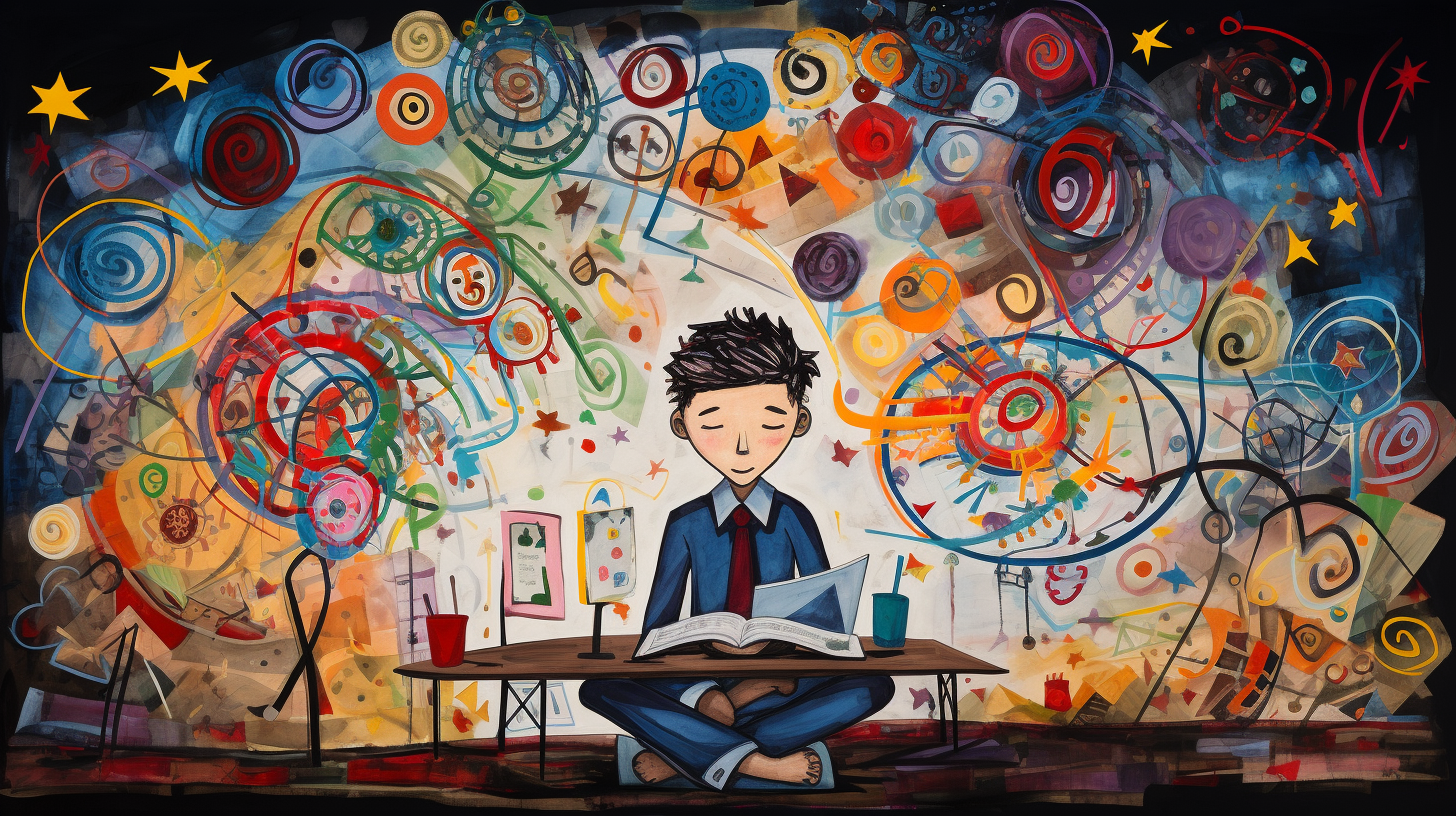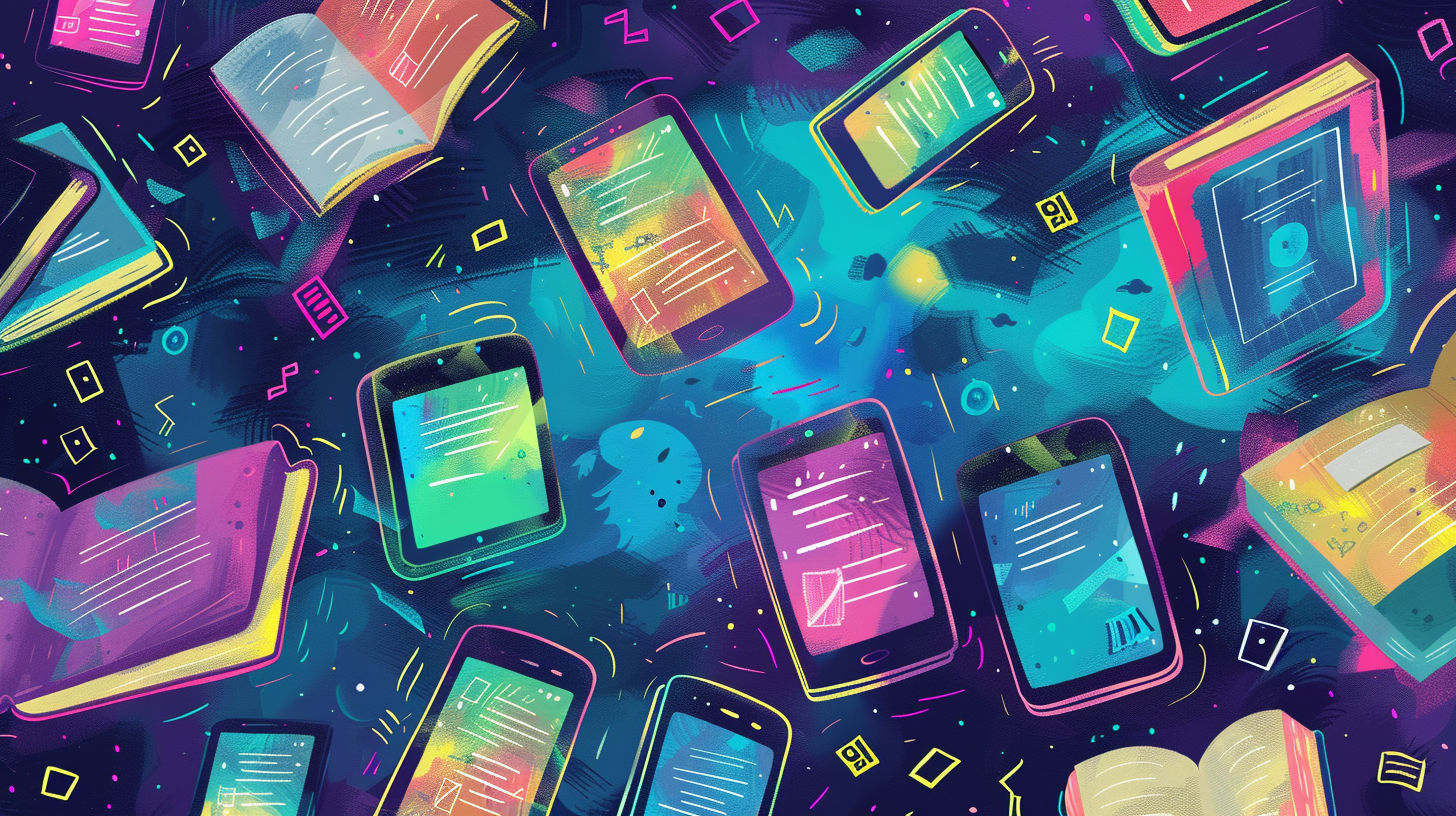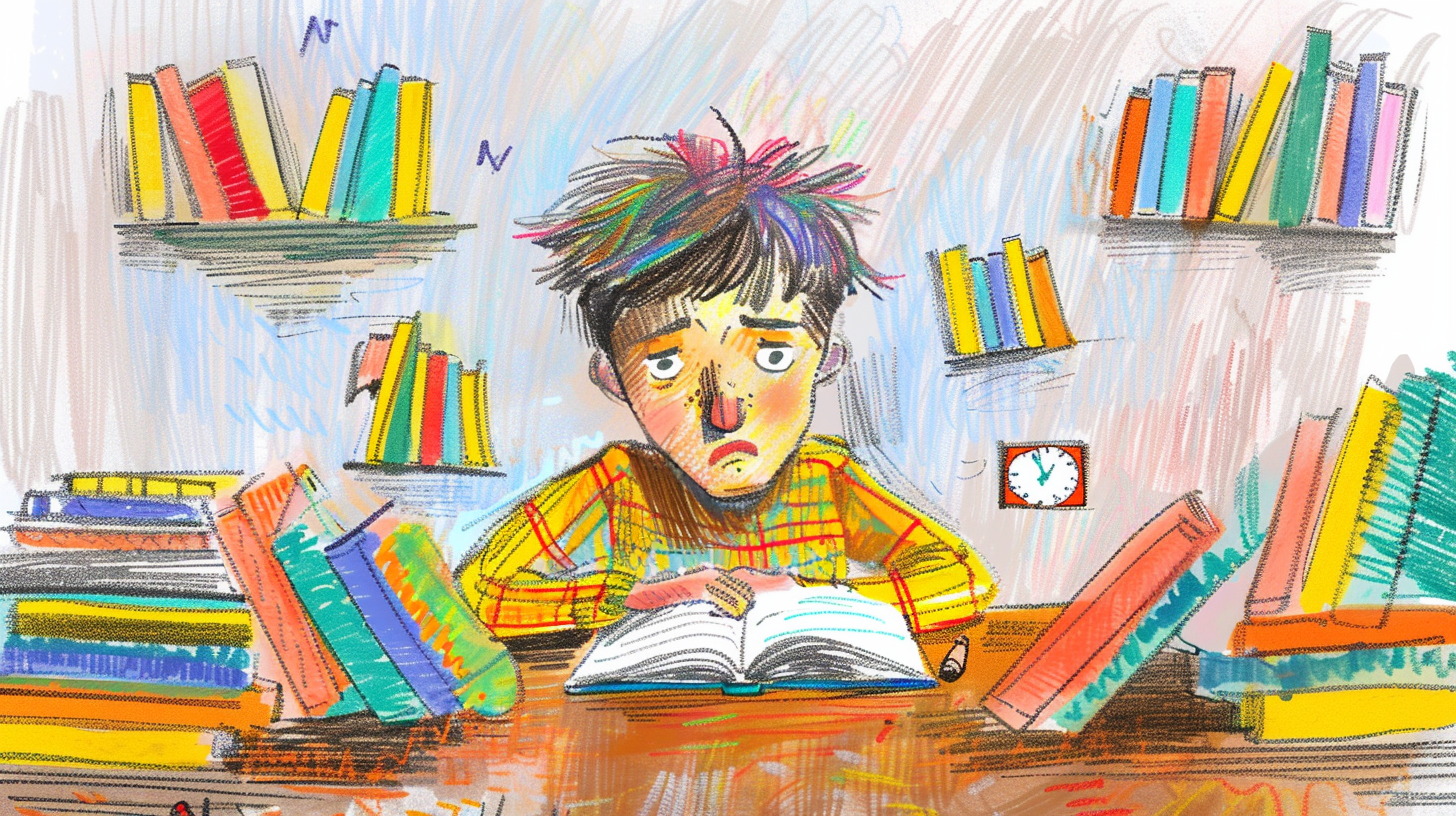Navigating the challenges of ADHD and reading can be a complex journey for many children. ADHD, a condition marked by inattention, hyperactivity, and impulsivity, often intersects with reading abilities in ways that can impact academic success. You’re not alone if you grapple with this intersection and seek clarity on supporting a child’s reading development.
In this text, we’ll explore the link between ADHD and reading, investigate understanding ADHD, and discuss its impact on reading. You’ll learn about effective strategies to support reading for individuals with ADHD, how to further develop reading skills, and when it’s time to seek professional help for reading difficulties associated with ADHD. Let’s unlock the potential for improved reading experiences together.
The Link Between ADHD and Reading
When you’re trying to understand ADHD and reading comprehension, it’s crucial to know how this neurodivergence affects the way you process information. If you have ADHD, the common association of ADHD with difficulty reading may not be surprising. In fact, it’s a challenge that affects both reading fluency and reading comprehension.
ADHD symptoms like inattention and impulsivity can make staying focused while reading quite tricky. For example, you might find yourself skipping words when reading or having to read sentences multiple times to ensure accuracy. This struggle often contributes to a feeling that reading takes too long, which at times leads to ADHD falling asleep when reading.
Even through these challenges, there are effective ways to improve reading skills. Strategies such as breaking text into smaller chunks or using reading aids like highlighters can significantly enhance focus and understanding. Also, engaging in activities like Neurofeedback, as practiced at institutes like the Drake Institute, has been shown to benefit auditory processing accuracy, memory, and other cognitive functions related to reading.
Reading With ADHD Adults
ADHD reading problems don’t just affect children but adults as well. Adult responsibilities often involve complex and lengthy texts, intensifying the need for reading strategies for ADHD. Utilizing tools like text-to-speech or audiobooks may help you engage with the material more comfortably, turning reading from a challenging job into a more enjoyable and successful experience.
For those wondering how to retain information with ADHD, it’s essential to recognize the value of repetitive reading. By revisiting the exact text, you can strengthen memory retention. Also, taking notes or discussing the reading material with others can further reinforce understanding.
Another critical approach to reading for ADHD involves managing the reading environment. Creating a distraction-free space or using noise-canceling headphones can reduce interruptions and enhance concentration, especially for adults reading with ADHD.
- Break reading materials into bite-sized sections.
- Read in a quiet, distraction-free environment.
- Incorporate assistive technology like audiobooks or text-to-speech.
- Practice active reading by taking notes and summarizing sections.
Understanding ADHD
What Is ADHD?
ADHD, or Attention Deficit Hyperactivity Disorder, is a neurodevelopmental condition that affects both children and adults. It impacts one’s self-control, attention span, and activity levels. Children with ADHD typically show symptoms early in life, often before the age of seven. ### Common Symptoms of ADHD
If you or someone you know has ADHD, you’re familiar with the common symptoms. These can include:
- Daydreaming frequently
- Forgetting or losing things often
- Engaging in impulsive behaviors
- Having difficulty resisting temptation
- Trouble taking turns
- Difficulty getting along with others
When reading with ADHD, you might experience challenges like skipping words, difficulty processing your reading, or even falling asleep. These symptoms can be incredibly frustrating if you’re trying to get through a book or comprehend detailed information.
Prevalence of ADHD in Children and Adults
ADHD is relatively common among children, with studies indicating that about 5-10% of school-aged children are affected. ADHD reading problems aren’t restricted to children; adults also face challenges. People with ADHD often use various strategies, such as breaking text into smaller sections, to manage their reading comprehension issues.
Adults with ADHD may notice that reading makes them sleepy, or they have trouble focusing while reading, which is not just an inconvenience but can affect their professional and personal lives. This is where audiobooks could serve as a powerful tool, allowing you to listen instead of read, helping you retain information more efficiently. Audiobooks can cater to ADHD reading difficulties, offering an alternative way to access literature and information.
The Impact of ADHD on Reading
Challenges Faced by Individuals with ADHD while Reading
When you’re reading with ADHD, you might find yourself skipping words or entire lines. This often happens because maintaining consistent attention to the text is challenging. Your eyes may drift, causing you to lose your place and making it difficult to follow the narrative or argument. Also, if you often find yourself reading but not processing the information, it is likely due to the inattention that characterizes ADHD.
Another issue is the tendency to fall asleep when reading, a problem known as ADHD falling asleep when reading. Although it’s not uncommon to feel drowsy while reading, for individuals with ADHD, this could stem from the immense effort it takes to focus, which can be both mentally and physically exhausting.
How ADHD Impacts Reading Comprehension
ADHD reading comprehension can be significantly affected by the disorder. If you’re struggling with fuzzy recall or understanding of what you’ve just read, it could be a sign of ADHD reading comprehension difficulties. Since ADHD impacts the executive functions of the brain involved in organizing and retrieving information, you may find it challenging to retain information with ADHD even after reading the material multiple times.
The research discrepancies may seem confusing, but they often point to the intrinsic difficulties in reading comprehension that adults with ADHD face. The problem isn’t just decoding words; it’s about grasping and remembering the main ideas and details.
ADHD and the Ability to Focus on Reading Material
For adults and children with ADHD, the task of how to focus on reading with ADHD is a prominent challenge. The difficulty in sustaining attention can make reading sessions drawn out and frustrating. You might experience reading and ADHD as a duo that doesn’t work well together, leading to repeated reading of sentences or paragraphs without real comprehension – a phenomenon sometimes referred to as reading but not processing ADHD.
To mitigate these issues, strategies such as breaking down reading material into more manageable parts and using tools like audiobooks can be highly beneficial. Audiobooks, in particular, offer a way to engage with stories and content without the strain of focusing on written words, thus improving ADHD reading comprehension. You can also take notes or pause to reflect as you listen, enhancing your ability to retain information with ADHD.
Strategies to Support Reading for Individuals with ADHD
Creating a Structured Reading Environment
Creating a structured environment is crucial in enhancing your reading experience with ADHD. Select a quiet space free from distractions. This way, you’ll minimize the chances of your mind wandering or inadvertently skipping words when reading.
ADHD can often lead to difficulty staying on task, so ensure you have all reading materials accessible, your area well-lit, and comfortable seating that supports sustained focus. Consistency in your reading routine can also bolster your ADHD reading comprehension, providing a predictable pattern that can ease the effort to settle down to read.
Implementing Multisensory Approaches to Reading
Multisensory techniques can be a game-changer if you’re grappling with ADHD and reading difficulties. Engage more than one sense to help lock in attention and enhance retention. For instance, pair reading with listening using audiobooks—this dual-input method can significantly improve comprehension and recall.
You can also use colored overlays to reduce visual stress that can cause fatigue or lead to you falling asleep when reading due to ADHD. Focusing on reading with ADHD is much easier when you can interact with the text, such as tracing words with a finger or taking notes, making the reading experience more engaging and dynamic.
Utilizing Technology and Assistive Tools
Leverage the power of technology to support your reading goals. Reading technology is particularly beneficial for those who have trouble processing written words, a common symptom of ADHD. Text-to-speech tools or audiobooks can be advantageous for reading comprehension in ADHD adults. These assistive technologies allow you to listen to the content, freeing up working memory and enabling better understanding without the strain of traditional reading.
eBooks with built-in dictionaries help retain information with ADHD by providing immediate definitions, making it easier to follow along and understand complex vocabulary. Also, apps designed for ADHD reading problems offer customizable backgrounds and fonts to reduce visual distractions and help you read better with ADHD.
Developing Reading Skills in Individuals with ADHD
Encouraging Regular Reading Practice
Regular practice is paramount to improve your reading skills effectively, especially if you have ADHD. Consistency is vital when dealing with ADHD reading difficulties. Introduce reading into your daily routine, but keep sessions brief to avoid feeling overwhelmed or experiencing ADHD and falling asleep when reading. For many, reading with ADHD is more manageable in short bursts. This prevents fatigue and helps maintain focus. Initiate a rewards system — like charts or stickers — to track your progress and make reading a more engaging activity.
For adults reading with ADHD, set personal goals and reward yourself upon completion. Explore audiobooks if you struggle with motivation or retaining what you’ve read. They can make reading more accessible and enjoyable, helping to keep information with ADHD by providing an auditory stimulus to aid focus and comprehension.
Improving Reading Comprehension through Active Reading Techniques
To bolster ADHD reading comprehension, integrate active reading techniques. This involves engaging with the text to promote better retention and understanding. Strategies like SQ3R — survey, question, read, recite, and review — can transform your approach to nonfiction texts in particular. This method guides you to ask questions before reading, providing structure and purpose and enhancing your comprehension.
If you’re dealing with ADHD and difficulty reading, try reading aloud or following along with an audiobook. This multisensory method can improve focus and help in reading but not processing ADHD challenges. Highlighting or note-taking can also prompt active engagement with the material, addressing issues like skipping words when reading ADHD.
Building Vocabulary and Word Recognition Skills
Expanding your vocabulary is vital for improving reading comprehension, particularly for ADHD and reading comprehension challenges. You can achieve this by employing flashcards or engaging with interactive spelling and vocabulary games. For ADHD reading problems in adults, vocabulary building can also involve using technology such as apps or software designed to strengthen language skills.
In the context of ADHD and reading books, selecting texts with built-in glossaries or using e-readers with definition features can be convenient. This eases learning new words in context and can mitigate ADHD reading difficulties, like difficulty retaining new vocabulary. Reading material that aligns with your interests can also enhance your motivation to learn, making the overall reading experience more fulfilling even with any ADHD reading symptoms you may encounter.
Seeking Professional Help for ADHD and Reading Difficulties
Specialists in ADHD Assessment and Intervention
When addressing ADHD and reading difficulties, consulting with specialists who understand the nuanced challenges you face is critical. These experts perform comprehensive evaluations, diagnosing ADHD and identifying specific reading challenges.
Neuropsychologists, psychiatrists, or specialized psychologists can pinpoint how ADHD impacts your reading. With their insight, they tailor interventions to improve your reading skills and comprehension, which is essential for academic success. They’re equipped with strategies like cognitive-behavioral therapy, which can enhance focus and reduce ADHD-related reading symptoms like skipping words or falling asleep when reading.
Implementing Individualized Education Plans (IEPs)
If assessments reveal that ADHD hampers your reading abilities, an Individualized Education Plan, or IEP, might be the next step. IEPs provide a customized framework for your learning experience, accommodating your unique needs.
Special education teachers prepare tailored reading programs to address reading comprehension and retention difficulties commonly faced by those with ADHD. IEPs often include multisensory instruction methods, extra time for reading assignments, and the use of technology aids—tools that ensure reading material is accessible and engaging, making it easier to retain information.
Collaborating with Teachers and Educational Professionals
Collaboration with educational professionals is vital for individuals with ADHD who experience reading challenges. Regular communication between you, your parents, and your teachers ensures that the strategies implemented match your needs, helping to improve your reading experience.
Educators may suggest reading tips for ADHD, like creating a distraction-free environment or breaking down reading tasks into manageable segments. Also, educational therapists can work one-on-one with you, employing tools and exercises designed to boost your reading and ADHD management skills.
Remember, practical professional support can significantly enhance reading proficiency, making it easier for you to focus and succeed academically. By recognizing and tackling ADHD symptoms that affect reading, you can better manage the difficulty reading with ADHD presents and enjoy success in your educational endeavors.
Conclusion
Mastering reading with ADHD can be challenging but far from impossible. By crafting a structured environment and embracing multisensory reading techniques, you’re setting the stage for success. Don’t hesitate to seek professional guidance; specialists can offer invaluable support tailored to your unique needs.
Remember, collaboration with educators is critical to fine-tuning your reading strategies. With these tools in hand, you’re well on your way to overcoming obstacles and excelling in your literary pursuits.
Frequently Asked Questions
Does ADHD get worse with age?
ADHD symptoms do not inherently worsen with age, but life’s increasing responsibilities can exacerbate the challenge of managing ADHD traits. The key is adapting coping strategies to adult life’s evolving stressors and demands.
Are people with ADHD good at reading others?
It’s a mixed bag—people with ADHD may be perceptive of others yet struggle with self-awareness. So, while they can be good at reading people, they often have difficulty gauging their own impact in social situations.
How can ADHD affect reading?
ADHD can significantly affect reading by impairing working memory, making it challenging to understand the main idea, retain details, and link new information to prior knowledge, which are all crucial components of proficient reading.
Why is reading so hard with ADHD?
Reading demands sustained attention and information processing, which ADHD hinders. Factors such as distractibility, information retention issues, and difficulty in maintaining focus make reading a strenuous task for individuals with ADHD.
What is high-functioning ADHD?
High-functioning ADHD refers to individuals who exhibit ADHD symptoms but retain the ability to perform daily tasks effectively. They might face challenges with attention or impulsivity but can cope with these issues without significant disruption to their life or work.




